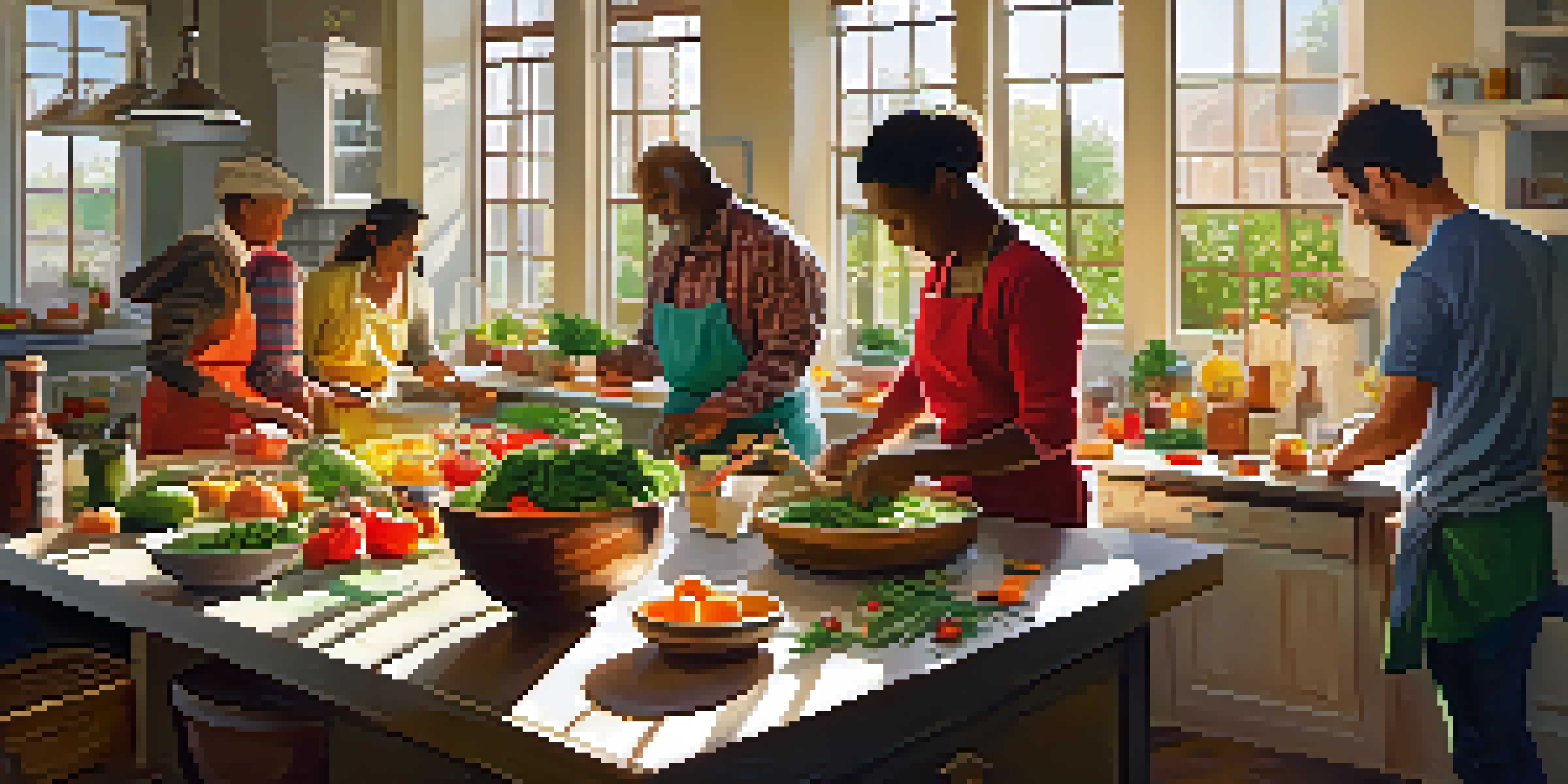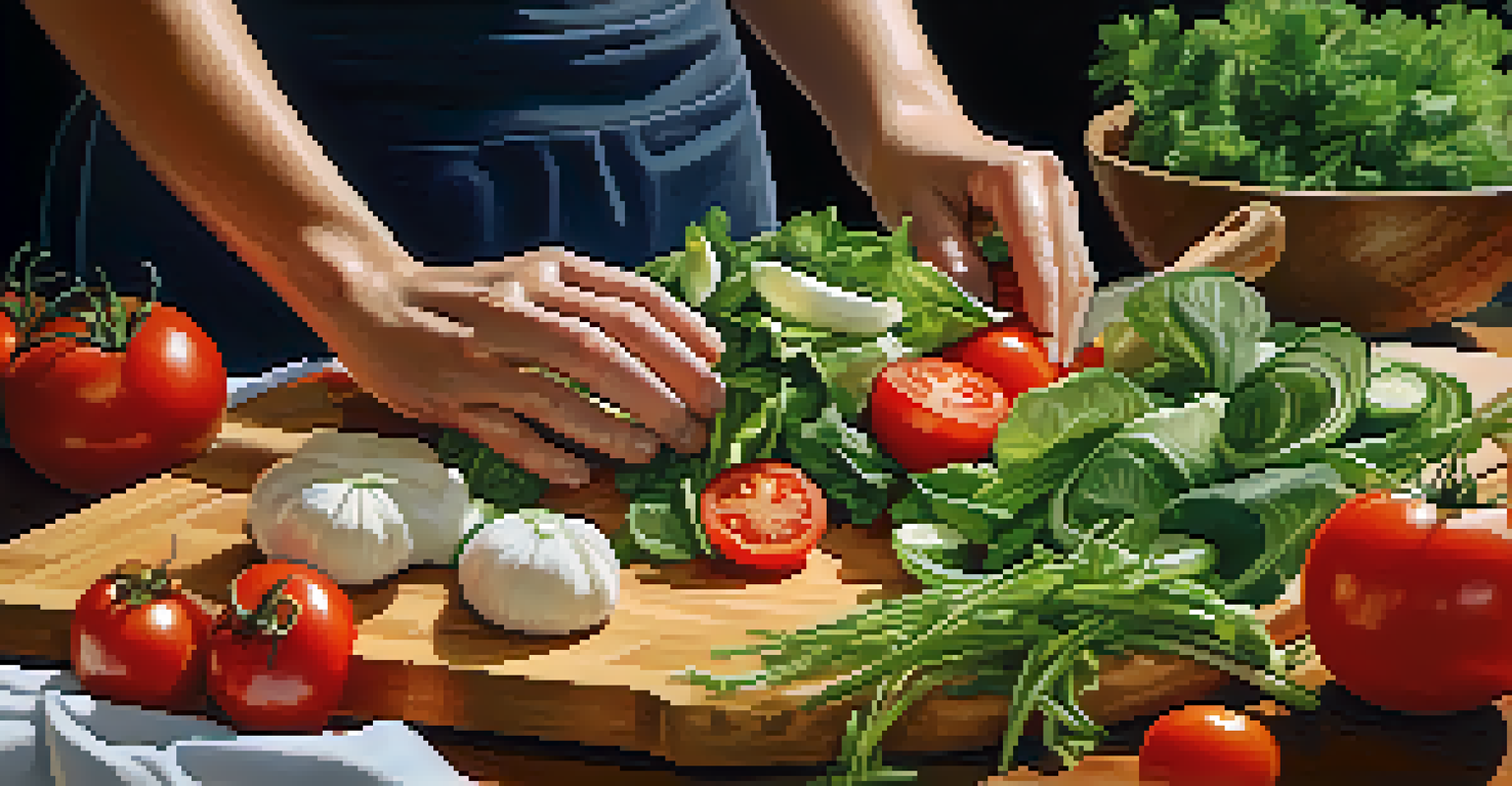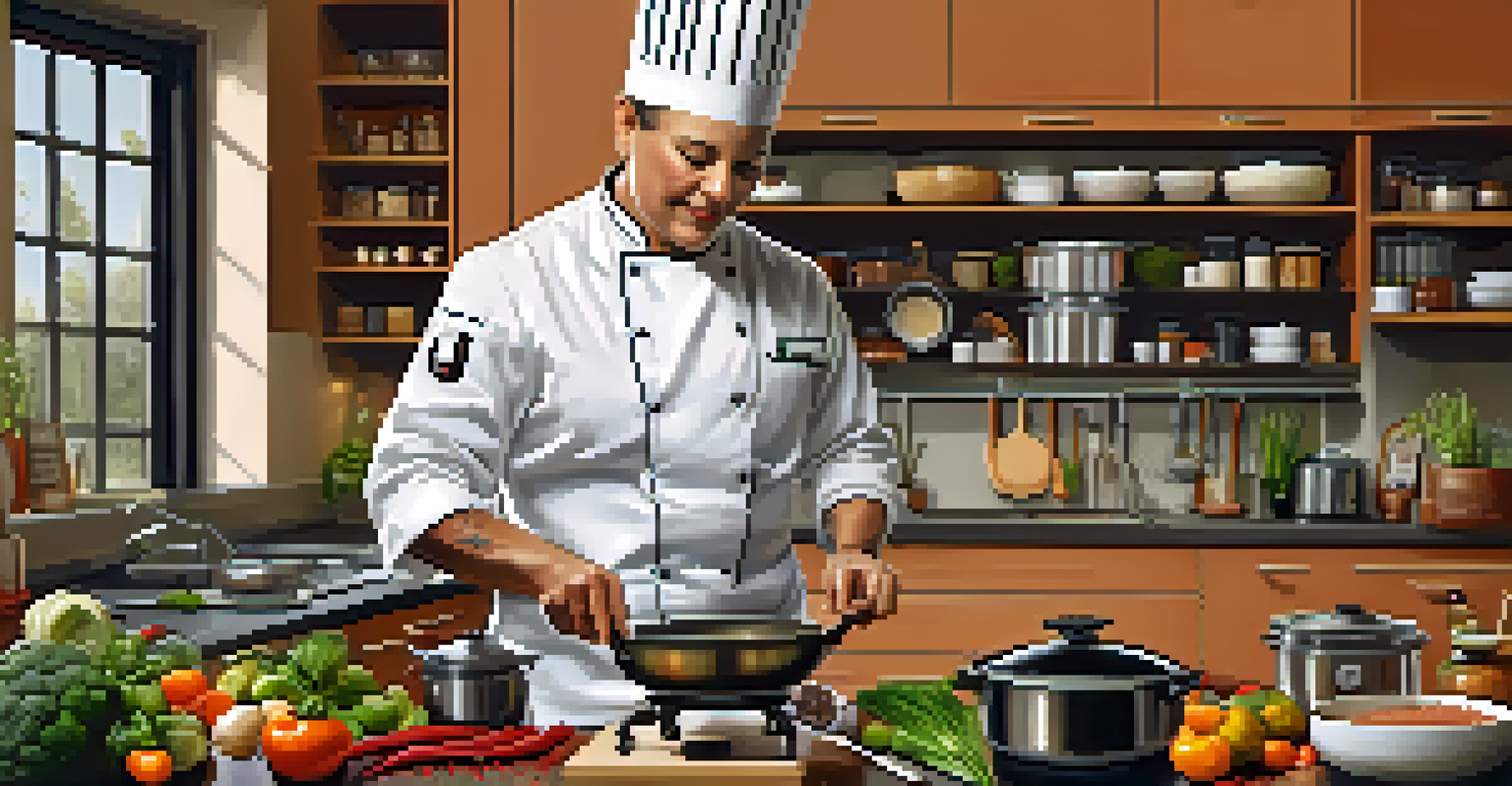Cooking for Wellness: Workshops to Enhance Your Health

Understanding the Link Between Cooking and Wellness
Cooking isn’t just about preparing meals; it’s a vital part of our health. When we cook at home, we have control over the ingredients we use, which can significantly impact our nutrition. This connection between food and wellness is the cornerstone of many cooking workshops today.
Cooking is like love. It should be entered into with abandon or not at all.
In these workshops, participants learn how to make healthier choices while preparing their meals. For instance, swapping out refined grains for whole grains can make a substantial difference in our diets. This hands-on approach makes it easier to understand the impact of our food choices on our health.
Moreover, cooking provides an avenue for mindfulness. Engaging in the process of chopping, mixing, and sautéing can be a relaxing escape from our busy lives. It encourages us to be present, which is essential for mental wellness.
Types of Cooking Workshops Available
Cooking workshops come in various formats, each catering to different needs and interests. From vegan cooking classes to meal prep workshops, there’s something for everyone. These classes are designed to teach practical skills while also focusing on health benefits.

For instance, a workshop centered on Mediterranean cuisine can introduce participants to heart-healthy ingredients like olive oil, fish, and fresh vegetables. This not only enhances cooking skills but also emphasizes the health benefits of the Mediterranean diet.
Cooking Enhances Health and Wellness
Home cooking allows individuals to control ingredients, promoting better nutrition and mindfulness.
Additionally, there are workshops that focus on specific dietary needs, such as gluten-free or low-sugar cooking. These classes help individuals adapt their cooking habits to better suit their health requirements.
The Benefits of Participating in Cooking Workshops
Participating in cooking workshops offers numerous benefits beyond just learning new recipes. First and foremost, these workshops foster a sense of community. Cooking together allows participants to connect, share stories, and build friendships over a shared love for food.
Let food be thy medicine and medicine be thy food.
Moreover, attendees gain confidence in the kitchen, which can lead to healthier eating habits. Knowing how to prepare nutritious meals can encourage people to cook at home more often rather than relying on takeout or pre-packaged foods.
Finally, cooking workshops often include nutritional education, helping participants understand the science behind their cooking choices. This blend of practical skills and knowledge empowers individuals to make healthier decisions long after the workshop ends.
Incorporating Seasonal Ingredients for Better Health
One exciting aspect of cooking workshops is the emphasis on using seasonal ingredients. Cooking with what's in season not only enhances flavor but also boosts nutritional value. Seasonal produce is often fresher, tastier, and more affordable than out-of-season alternatives.
For example, a summer workshop might focus on recipes that highlight fresh tomatoes, zucchini, and berries. Participants can learn to create vibrant salads or refreshing smoothies, showcasing the best of what summer has to offer.
Workshops Foster Community and Skills
Cooking workshops not only teach practical skills but also create a sense of community among participants.
By incorporating seasonal ingredients, participants also learn about sustainability. Supporting local farmers and reducing the carbon footprint associated with transporting food can be an essential lesson in these workshops.
Mindful Cooking: A Path to Mental Wellness
Mindful cooking is a concept that many workshops now embrace, blending culinary skills with mental health benefits. This practice encourages participants to engage all their senses while cooking, promoting a deeper connection to the food they prepare.
As participants chop vegetables or stir sauces, they are encouraged to focus on the textures, colors, and aromas. This heightened awareness can help reduce stress and anxiety, making cooking a therapeutic activity.
Incorporating mindfulness practices into cooking workshops can transform the kitchen into a sanctuary. It allows individuals to unwind and enjoy the process, which is just as important as the final dish.
Learning from Experts: Who Leads Cooking Workshops?
Cooking workshops are often led by experienced chefs, nutritionists, or health coaches who bring a wealth of knowledge to the table. These experts share their culinary skills and insights on how to prepare meals that nourish the body and soul.
For instance, a registered dietitian may lead a workshop on meal planning for optimal health, teaching participants how to create balanced meals. Their expertise adds a layer of credibility and ensures that attendees are learning from the best.
Seasonal Ingredients Boost Nutrition
Using seasonal produce in cooking enhances flavor and supports sustainability while improving health.
Additionally, many workshops feature guest chefs who specialize in particular cuisines or cooking techniques. This variety keeps things fresh and exposes participants to new ideas and flavors.
Finding the Right Cooking Workshop for You
With so many cooking workshops available, it can be overwhelming to find the right one. Start by considering your dietary preferences and health goals. Are you looking to learn quick weeknight meals or explore gourmet cooking? Knowing what you want can help narrow down your options.
Research local cooking schools, community centers, or online platforms that offer workshops. Reading reviews and testimonials can provide insight into the experiences of past participants, helping you make an informed decision.

Finally, don’t hesitate to reach out to instructors with any questions. A good workshop will prioritize participant satisfaction and be happy to guide you in choosing a class that aligns with your health journey.
The Future of Cooking Workshops in Health and Wellness
As people become increasingly aware of the importance of nutrition and wellness, the demand for cooking workshops is on the rise. These classes are evolving to meet the needs of diverse populations, including those with specific dietary restrictions or food allergies.
Innovative formats, such as virtual cooking classes, are also gaining popularity. This allows participants to join from the comfort of their homes while still engaging with instructors and fellow participants.
In the future, we can expect cooking workshops to continue blending culinary education with wellness practices. This holistic approach not only nurtures our bodies but also fosters a community dedicated to living healthier, happier lives.